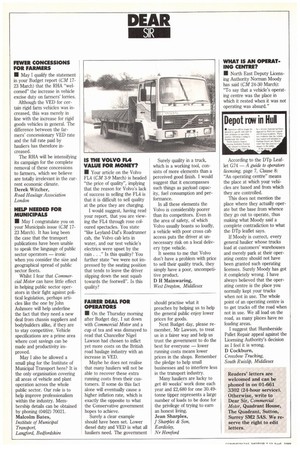DEAR
Page 38

If you've noticed an error in this article please click here to report it so we can fix it.
SIR
FEWER CONCESSIONS FOR FARMERS May I qualify the statement in your Budget report (CM 1723 March) that the RHA "welcomed" the increase in vehicle excise duty on farmers' lorries.
Although the VED for certain rigid farm vehicles was increased, this was merely in line with the increase for rigid goods vehicles in general. The difference between the farmers' concessionary VED rate and the full rate paid by hauliers has therefore increased.
The RHA will be intensifying its campaign for the complete removal of these concessions to farmers, which we believe are totally irrelevant in the current economic climate.
Derek Witcher, Road Haulage Association London HELP NEEDED FOR MUNICIPALS IN May I congratulate you on your Municipals issue (CM 1723 March). It has long been the case that the transport publications have been unable to speak the language of public sector operators — ironic when you consider the size and geographical spread of public sector fleets.
Whilst I fear that Commercial Motor can have little effect in helping public sector operators in their fight against political legislation, perhaps articles like the one by John Ashmore will help underline the fact that they need a new deal from chassis suppliers and bodybuilders alike, if they are to stay competitive. Vehicle specifications are a prime area where cost savings can be made and productivity improved.
May I also be allowed a small plug for the Institute of Municipal Transport here? It is the only organisation covering all areas of vehicle and plant operation across the whole public sector. Our role is to help improve professionalism within the industry. Membership details can be obtained by phoning (0462) 70021. Malcolm Bates, Institute of Municipal Transport, Langford, Bedfordshire IS THE VOLVO FIA VALUE FOR MONEY?
• Your article on the Volvo FM (CM 3-9 March) is headed "the price of quality", implying that the reason for Volvo's lack of success in selling the FL4 is that it is difficult to sell quality at the price they are charging.
I would suggest, having read your report, that you are viewing the FM through rose coloured spectacles. You state "like Leyland-Dafs Roadrunner cab, the Volvo cab lets in water, and our test vehicle's electrics were upset by the rain . . ." Is this quality? You further state "we were not impressed by the seating position that tends to leave the driver slipping down the seat squab towards the footwell". Is this quality?
FAIRER DEAL FOR OPERATORS • On the Thursday morning after Budget day, I sat down with Commercial Motor and a cup of tea and was dismayed to read that Chancellor Nigel Lawson had chosen to inflict yet more costs on the British road haulage industry with an increase in VED.
Maybe he does not realise that many hauliers will not be able to recover these extra running costs from their customers. If some do this fact alone will eventually cause a higher inflation rate, which is exactly the opposite to what the Conservative government hopes to achieve.
Surely a clear example should have been set. Lower diesel duty and VED is what all hauliers need. The government Surely quality in a truck, which is a working tool, consists of more elements than a perceived good finish. I would suggest that it encompasses such things as payload capacity, fuel consumption and performance.
In all these elements the Volvo is considerably poorer than its competitors. Even in the area of safety, of which Volvo usually boasts so loudly, a vehicle with poor cross cab access puts the driver at unnecessary risk on a local delivery type vehicle.
It seems to me that Volvo don't have a problem with price to sell their quality truck, they simply have a poor, uncompetitive product.
D H Mainwaring, West Drayton, Middlesex should practise what it preaches by helping us to help the general public enjoy lower prices for goods.
Next Budget day, please remember, Mr Lawson, to treat us in a fairer way and help us trust the government to do the best for everyone — lower running costs means lower prices in the shops. Remember the pledge to help small businesses and to interfere less in the transport industry.
Many hauliers are lucky to get 40 weeks' work done each year and £2,680 for one 30.49tonne tipper represents a large number of loads to be done for the privilege of trying to earn an honest living.
Jean Sharpies, J Sharpies & Son, Eardisley, Nr Hereford
According to the Dip Leaflet G74 — A guide to operators licensing, page 7, Clause 8: "An operating centre" means the place at which your vehicles are based and from which they are controlled.
This does not mention the place where they actually operate but the base from whence they go out to operate, thus making what Moody said a complete contradiction to what the Dip leaflet says.
If Moody is correct, every general haulier whose trucks load at customers' warehouses and merely park at their operating centre should not have been granted such operating licenses. Surely Moody has got it completely wrong. [have always believed that the operating centre is the place you normally kept your trucks when not in use. The whole point of an operating centre is to get trucks off the road when not in use. We all load on the road, as many places have no loading areas.
I suggest that Humberside Pallet Repair appeal against the Licensing Authority's decision as I feel it is wrong.
D Cockburn, Crossbow Trucking, South Ruislip, Middlesex




































































































































